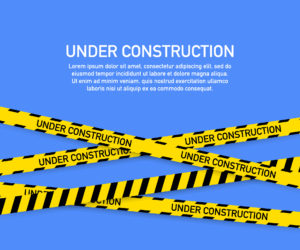Are you planning to write content for your website? If you have good writing skills, it’s certainly possible to write the website content for your own business. But that doesn’t mean you should. There are some very good reasons to invest in engaging a professional content writing service.
Putting the right words on the page is far more important than many people realise. And not as easy as many think. Your goal isn’t merely to write content that’s grammatically correct and clearly explains what you do. It’s to create content that inspires your ideal customers to contact your business instead of one of your competitors.
And as experienced website copywriters will tell you, that’s a different ball game.
Being able to write well doesn’t automatically equip you for the task of creating the right website content – just as knowing how to use a hammer doesn’t give you the knowledge and skill to build a house. Because proficient writing isn’t the only skill you need for the job.
Let’s look at what goes into creating effective website content.
Planning your Website Content
There’s a level of planning needed before you start to write content for your website.

When you’re arranging a new website, you’ll be making decisions around the design and navigation options. These decisions don’t only create the user experience, they influence the structure of the content you will need to create. For example:
- Which ‘pages’ will you have?
- How many?
- What will they be called?
- What will the page layout look like?
- Are there any banners, slides, or boxes on the page?
- How will visitors navigate through related pages?
These choices tie in with what copy you need to write, and how you will structure and present it. It’s hard to make decisions about the design elements or the content in isolation – you need to think about how they will work together.

But these aren’t the only things that need to be considered at the content planning stage.
Words That Resonate With Your Target Market
Let’s pretend. You’re a 25-year-old with a great income and you hope to achieve big things in life. You’ve decided you need financial guidance. You visit two websites. Both look professional and their credentials are the same. One says they help people of all ages plan for retirement. The other helps young people to establish a life of financial freedom.
I’m fairly sure you’re calling the second one. Why? Because your goal isn’t to be a well off 70-year-old. It’s to establish financial freedom early so you can enjoy your life. The words on the second website spoke to your goal. Possibly because that business identified people in your age group as their key target market, and carefully crafted the content on their website to appeal to you.
How do you create content that resonates with the right people? It’s all about knowing your ideal clients and understanding their goals, their ‘pain points’, and the factors they consider when making a buying decision.
However, to complicate matters, you might have more than one type of ideal client. Perhaps you service several key industries. Or you might have both residential and commercial clients. Or retail and wholesale. Each client type might have different goals, pain points, and buying considerations. That makes it difficult – and potentially unsatisfactory – to create one piece of content around your services that tries to resonate with all of them.
You’ll need to consider this when deciding how to present content on the website, and what content to create.

If you’ve worked with a marketing consultant or brand strategist, you may already have developed some strategic information that helps you do this – buyer personas, key messaging, and a brand voice. You’ll need to apply that information to the content you write.
For those who haven’t had that level of strategic marketing help, consider outsourcing to trusted content agency instead. Good website copywriters know how to elicit much of the relevant information from you, and how to use it when creating the copy.
Just as they know the importance of writing concisely.
Content Readability
When you’ve planned the content to perfection and the writing begins, get to the point and make it easy to read.
We’re all busy. We want to find information quickly. We don’t want to read jargon. Long sentences sap our energy, and big blocks of text make us want to click the back button.
Writing concisely can be surprisingly difficult if you’re accustomed to writing lengthy documents such as business or research reports, or academic papers. But if you’re willing to put in the time and effort, there are online tools (e.g., Grammarly or Hemingway) you can use to help you sharpen the copy as you write.
SEO Considerations
Does your business rely on people searching for your products or services online? If it does, then SEO – search engine optimisation – is yet another factor that needs to be considered during the writing process.

There are two simple reasons for this:
- People will tend to use certain phrases or terms when searching. If your website isn’t visible in the results when they do, it’s unlikely they’ll discover your website.
- To ‘index’ your website appropriately, Google and other search engines need to understand what your business offers, so they can match it with the most relevant search queries. And search engine bots read the content on your website to get that understanding.
Incorporating appropriate search terms helps both search engines and visitors to understand what you offer. You can find out about the common search terms relevant to your business by arranging SEO keyword research. Many professional website content writers include ‘basic keyword research’ as part of their service if they are writing the copy. If you’re writing your own content, you can engage an SEO consultant to do it for you.
However, ‘basic’ is just that, and there’s a lot more to creating copy that works well from an SEO perspective – from ensuring the URL name and content are a good match, to creating content that works with Schema markup to enhance visibility.
Covering these things won’t automatically see you rise to the top of the search listings unless you’re a very niche business with little or no competition. But if you’re just starting out, ensuring you have a user-friendly website with quality content and basic SEO is a good first step to online visibility.
Your Brand Voice
It’s a great idea to identify your brand voice before creating the content for your new website. Not only do you want an appropriate style and tone for the content you’re doing now – you’ll want content across your website in the future to have a consistent voice, regardless of who creates it. (This article on the Semrush blog has some great tips for defining brand voice.)
Final tip
Creating effective content requires three things: strategic thinking, thorough planning, and good copywriting. Don’t skip the first two!
If you’re too busy to DIY or just feel that engaging professional content writers is the way to go, talk to us about our website content planning and copywriting packages. You can call, email, or use the contact form to request details.
Leonie Seysan is the Director of Article Writers Australia, and manages the team of professional writers and editors. She holds a Bachelor of Communications Degree (Media Studies).





